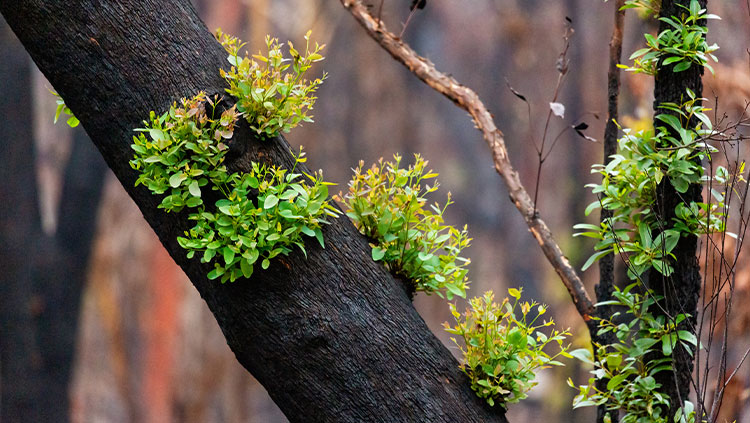Bushfire recovery: a hard and slow rise from the ashes
Content Summary
- Disaster recovery

This article was current at the time of publication
Before the COVID-19 pandemic closed businesses across Australia the 2019-20 bushfire season had already wreaked havoc on many communities – mostly in regional areas – and decimated small businesses.
Dubbed the “Black Summer”, the fires raged through many Australian states including Victoria, New South Wales and South Australia. They were the worst in decades, with many people losing their homes and livelihoods.
Recovery will be long and hard, and with the added worry of COVID-19 the struggle even more difficult.
However, the first green shoots of recovery are now apparent. While the future is still unclear for many people, access to a $2 billion Federal Government grants assistance program, administered by the National Bushfire Recovery Agency, may provide some much-needed assistance.
Embers still burning
For areas reliant on tourism, the bushfires annihilated the summer season. Anthony Wood CPA, a partner at Eager and Partners in Lakes Entrance, Victoria, says the impact was immediate and he is working with clients to access financial support and help them to plan the future.
“The beauty of the place is its remoteness,” Wood says. “We rely on holidaymakers who come here and stay for a time and that didn't happen this year. I was back at work in early January and it was like a ghost town – it looked like the middle of winter in terms of the number of people around, [and they were] mainly firefighters staying in town.”
Lack of vacationers has impacted the whole community, he adds. His practice has a range of clients, including retailers and farmers, as well as those in the fisheries and tourism industries. For Wood, the challenge will be to keep them financially afloat so they can trade again in summer.
“We’ve been helping clients realise that there are grants available and helping them apply,” he says.
“You have to be able to prove that you've dropped 40 per cent in income to get a bushfire support grant. Every dollar is helpful, but when you might turn over $200,000 for a year and 40 per cent of that money comes in over six weeks, that's $80,000. The grant won’t cover that, but it will help.”
For Jenni Bottroff CPA, partner at BHC Partners in Adelaide, South Australia, the impact of the fires was both professional and personal, with one office and a staff member in the Adelaide Hills under direct threat.
“It was phenomenal,” Bottroff recalls. “The Friday that it hit, I was in the city office, but we had a staff member at the office in the hills and we were desperately watching the progress to see which way the wind was blowing.
"We were lucky in the end in that our office [suffered only] minimal damage and our staff member was safe, but we do have many clients who have suffered greatly.”
Resistance to applying for disaster relief assistance
Encouraging clients to access financial support has been a challenge at times, Bottroff says. The small and stoic community has an attitude of “getting on with things” and applying for assistance isn’t usually the first option.
“There’s an amazing set of people here and a lot of them would say to me, ‘I don’t need any help’. As a firm, we have tried to encourage them to apply for whatever grants they were eligible for and to access the local recovery centre for assistance as well.
“People often don’t realise how long it takes to recover. We've been told that it can take up to roughly 18 months for the landscape to recuperate and start to show signs of life.
“But it can take eight to 10 years for an individual to deal with what's happened to them. I’m encouraging people to take whatever assistance is being offered to help them begin that recovery.
“I’ve one client who lost his home and his whole farm, and he just thinks he’s lucky because he still has his sheep. That's [an example] of what always amazes me. The people I deal with here can always see a silver lining and so we are helping them work their way back to a financially viable position with whatever support is on offer.”
The invisible threat of COVID-19
COVID-19 was an extra blow to Wood’s community. Businesses were already struggling from a lack of traffic and lockdown rules even further affected small operators, particularly those in tourism.
“It was a kick in the guts when it happened, but there is a lot more stimulus through COVID-19 than for the fires,” Wood says.
“The cash flow boost and the JobKeeper scheme might just help struggling businesses get through the winter period, but it [depends] on the Australian economy and people’s confidence to spend money again on travel.”
Bottroff says the COVID-19 stimulus package has also been very welcome but notes the difference in accessing it compared to the bushfire support.
“There's been a lot of assistance with the fires, but it's not been as easy to access the COVID-19 grants. There seem to be more things people need to prove have happened to them to get any assistance – we're talking about people who have lost their livelihood or their homes, or sometimes both, and there are a lot of hoops to jump through to prove that, [which] has added to some people not accessing [the funds],” she says.
In terms of her own business, Bottroff says their diverse client base helped the firm get through both disasters.
“Having businesses in the city we’re looking after and businesses in the hills have helped us,” she says. “Many of our clients were concerned, checking in on us, making sure we are OK and wanted to help those in the hills after the bushfires, which was fantastic to know.
“With COVID-19, we have also all been working together. I think if we had a clientele focused on only one industry greatly affected by COVID-19, it might have [been] harder for us.”
Wood says that workwise, this period has been unprecedented, and like many other practices, the firm has experienced a surge in the need to help clients accessing stimulus payments. That aside, the business is in good shape.
“It’s been keeping us busy – the next focus will be how the economic downturn will affect us all and what the future will look like,” he says.
CPA Australia’s COVID-19 Road to Recovery
Discover more
Disaster recovery for SMEs after Cyclone Gabrielle
Accountants can play a key role in helping SMEs plan how or whether to reopen
- Disaster recovery
article·Published onSmall business trends 2021: Advisers prove the key to survival
Pactitioners’ efforts in 2020 helped many SME clients. Here’s a look at what 2021 forecasts
- Disaster recovery
article·Published onLong-term disaster recovery plans
Reflect on the lessons learned from your recovery to ensure your business is in the best possible trading position
- Disaster recovery

Disaster recovery
Advice, resources and strategies for recovering your business after a disaster
- Disaster recovery
- Business management
Tax issues associated with a natural disaster
Read about the tax issues businesses may face following a disaster
- Disaster recovery
- Taxation
Business recovery reality check
Businesses should consider conducting a ‘reality check’ after a disaster to assess whether they’re viable for future growth
- Disaster recovery
- Business management



